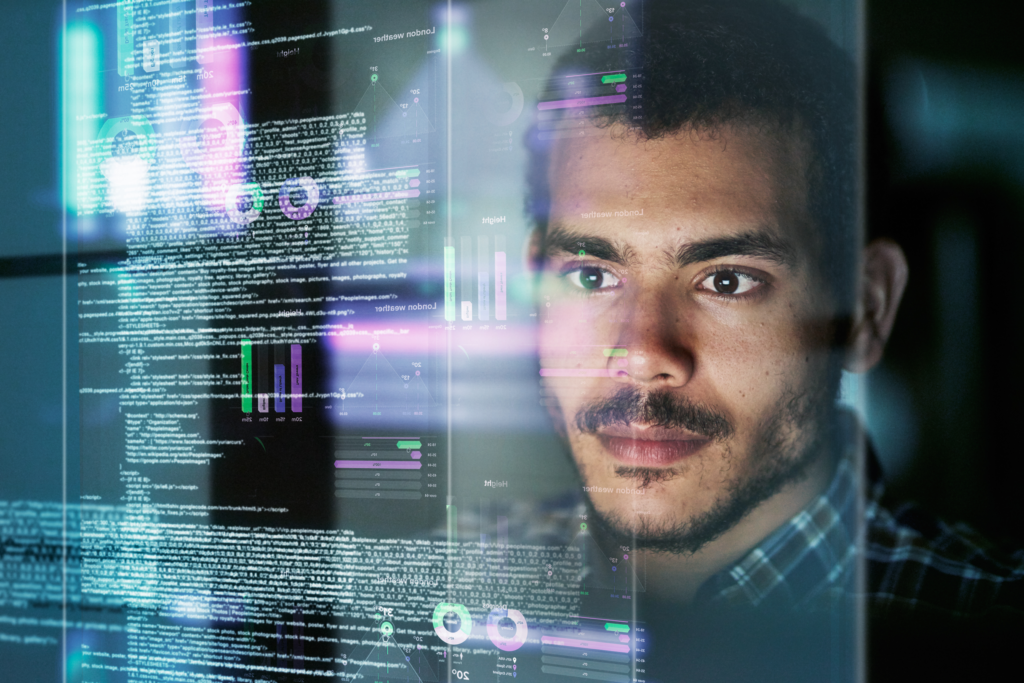Artificial Intelligence (AI) is revolutionizing software engineering, significantly enhancing the efficiency and quality of production and services. By integrating AI into operations, companies can optimize processes in three key areas: process automation, decision-making assistance, and code quality improvement.
At Amaris Consulting’s Digital Solutions Center of Excellence, AI is opening new horizons. It enhances process optimization and transforms the role of software engineers, allowing them to focus on more complex and creative tasks.
Join us as we explore how AI is reshaping software engineering roles and processes, driving innovation and efficiency. Discover the dynamics between AI and human expertise as we take a closer look at the opportunities and challenges of integrating AI into development practices.
AI in action
1. Process Automation
AI enhances automation by optimizing software development, testing, and deployment processes. This reduces human errors, speeds up development, improves software reliability, and shortens delivery cycles.
2. Decision-Making Assistance
AI provides essential tools for decision-making. With predictive analytics and data-driven insights, AI enables decision-makers to make more informed and strategic choices. This helps to predict trends, identify opportunities, and mitigate risks, leading to better business outcomes.
3. Code Quality Improvement
AI plays a vital role in improving code quality. It analyzes source code to detect errors, bugs, and security vulnerabilities, reducing the time needed for corrections and enhancing overall quality. This results in more reliable and secure software that better meets user needs.
Ultimately, AI accelerates software development processes and lowers integration costs. However, it’s essential to use these tools with careful judgment, as they can sometimes produce unsuitable or substandard solutions.
Evolving roles
As AI reshapes the role of software engineers, they continue to depend heavily on their expertise and creativity. While AI tools are powerful, they mainly enhance developers’ capabilities rather than replace them. These tools automate repetitive tasks like running tests or managing data entry, allowing developers to focus on complex, creative problem-solving.
Machine learning models enable developers to predict potential issues before they arise, ensuring applications are more robust. This predictive capability helps identify hidden faults, significantly reducing the risk of costly errors. Additionally, AI systems provide real-time feedback on code quality, speeding up the process by minimizing lengthy debugging sessions.
The economic impact of integrating AI into software development is substantial. Companies can allocate budgets more efficiently, directing funds towards innovation and research, which are essential for staying competitive in the tech-driven market. AI tools also reduce costs by improving collaboration among distributed teams, optimizing resource allocation, and potentially decreasing the need for extensive manual quality assurance.
Despite these advancements, human intuition, experience, and ethical judgment remain irreplaceable in software development. AI cannot fully understand user needs or respond flexibly to unexpected problems creatively. Developers use AI to amplify their capabilities and push the boundaries of technology, but they continue to drive core innovations and make crucial decisions.
A seamless collaboration
As AI becomes increasingly integrated into the day-to-day operations of organizations, the future holds immense potential for innovation. To stay ahead of this evolution, software engineers must continually update their skills to master emerging technologies. With AI becoming more integral to software development, engineers must navigate both technical advancements and ethical considerations. This involves learning new programming languages and AI systems while understanding ethical implications such as bias avoidance and data security.
Moreover, as the role of software engineers evolves, they are likely to transition from traditional coding to designing AI-driven solutions and managing AI operations. At Amaris Consulting, we support this shift through targeted training programs that help engineers adapt effectively. Future success for software engineers will depend on their ability to blend technical expertise with ethical responsibility, leveraging technology to enhance human capabilities responsibly.
Our Center of Excellence serves as a robust incubator for AI innovation and application, empowering software engineers by accelerating their skill development and maintaining high operational standards.
In conclusion, AI offers numerous advantages for both our teams and clients. Our consultants refine their expertise while integrating AI ethically and responsibly into our development processes, and our clients benefit from innovative and efficient IT solutions. The future of Digital Solutions looks promising, characterized by seamless collaboration between AI and human expertise to pioneer advanced technological solutions.
Visit our Digital Solutions Center of Excellence to explore our AI innovation and application!


